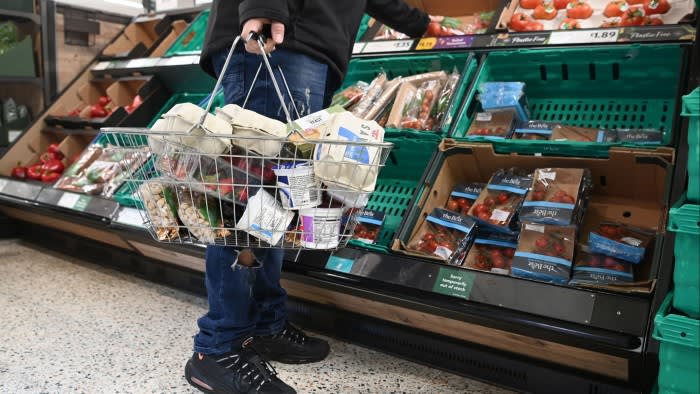
Stay informed with free updates
Simply sign up to the UK inflation myFT Digest — delivered directly to your inbox.
The UK’s inflation rate fell sharply in February, bolstering economists’ arguments for the Bank of England to start cutting interest rates this year as it makes headway in bringing price growth under control.
The consumer prices index rose by an annual 3.4 per cent last month compared with a 4 per cent year on year rate in January, according to the Office for National Statistics. That left headline inflation lower than the 3.5 per cent rate forecast in a Reuters poll of economists.
Core inflation, which excludes food and energy, fell to 4.5 per cent from 5.1 per cent previously, also slightly lower than the 4.6 per cent predicted by economists.
Sterling nudged lower after the data. The pound was down 0.03 per cent against the dollar at 1.2716.
The fall was gratefully seized upon by chancellor Jeremy Hunt, who has been urging Conservative MPs to hold their nerve after two weeks of party turmoil.
“The plan is working. Inflation has not just fallen decisively but is forecast to hit the 2 per cent target within months,” Hunt said.
The BoE in February predicted price growth was on track to drop to its 2 per cent target in the second quarter of the year as falling energy prices help lower UK inflation. But it has insisted it cannot yet relax monetary policy given stubborn growth in services prices and wages, warning of the risk that price growth subsequently gains traction again.
Service price inflation eased to 6.1 per cent from 6.5 per cent in January, the ONS said, in line with BoE expectations. Arguments for the BoE’s tough monetary policy to be continued hinge on the outlook for services inflation, which officials see as a key gauge of domestic pricing pressures as external drivers of inflation such as elevated fuel prices fade.
The central bank is also keenly watching labour market indicators, notably wage gains. Excluding bonuses, annual wage growth slowed to 6.1 per cent in the three months to January in the UK, from 6.2 per cent previously, still well above the level the BoE would be comfortable with.
The BoE last raised borrowing costs in August, pushing its key rate to 5.25 per cent. It has since left policy unchanged, and City forecasters widely expect it to announce on Thursday it is holding rates steady at that level.
That would chime with the approach taken by the US Federal Reserve and European Central Bank, which have both signalled they will start reducing rates only when they have enough evidence that inflation is heading durably lower.
Surging prices have imposed a heavy toll on UK household finances, and even after the recent inflation slowdown the high level of prices is putting pressure on living standards. The latest forecasts from the Office for Budget Responsibility, the government’s fiscal watchdog, show that per-person real household disposable incomes will only recover their pre-pandemic peaks by 2025-26.
Read More: World News | Entertainment News | Celeb News
FT










